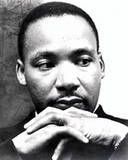 In April 1963 (only 45 years ago), a young Martin Luther King, Jr. (then only 34 years old) lead a march in Birmingham, Alabama for which he was jailed. While he sat in his jail cell, a group of clergymen sent him a letter which basically asked him why he brought his demonstrations to disrupt the peace of Birmingham.
In April 1963 (only 45 years ago), a young Martin Luther King, Jr. (then only 34 years old) lead a march in Birmingham, Alabama for which he was jailed. While he sat in his jail cell, a group of clergymen sent him a letter which basically asked him why he brought his demonstrations to disrupt the peace of Birmingham.Dr. King set pen to scraps of paper in his jail cell and wrote what plezWorld considers to be the Magna Carta and Declaration of Independence -- all rolled into one -- of the Civil Rights Movement, as a reply to the clergymen's letter.
It is interesting to note that the Civil Rights Act of 1964 by President Lyndon B. Johnson alittle over a year later, thanks in large measure to the efforts of one Dr. Martin Luther King, Jr.
As we pause to celebrate the life of the Greatest American, tarry a few minutes in plezWorld and read Dr. King's Letter from Birmingham Jail. This letter is not as widely publicized and distributed as the "I Have A Dream" or "I've Been To The Mountaintop" speeches, but this letter lays out the entire rationale and strategy of the Civil Rights Movement. Dr. King's stunning prose, and his grasp of psychology and human history while being confined to a jail cell is mind boggling. Excerpts of the letter follows:
But more basically, I am in Birmingham because injustice is here. Just as the prophets of the eighth century BC left their villages and carried their "thus saith the Lord" far beyond the boundaries of their home towns, and just as the Apostle Paul left his village of Tarsus and carried the gospel of Jesus Christ to the far corners of the Greco-Roman world, so am I. compelled to carry the gospel of freedom beyond my own home town. Like Paul, I must constantly respond to the Macedonian call for aid.
Moreover, I am cognizant of the interrelatedness of all communities and states. I cannot sit idly by in Atlanta and not be concerned about what happens in Birmingham. Injustice anywhere is a threat to justice everywhere. We are caught in an inescapable network of mutuality, tied in a single garment of destiny. Whatever affects one directly, affects all indirectly. Never again can we afford to live with the narrow, provincial "outside agitator" idea. Anyone who lives inside the United States can never be considered an outsider anywhere within its bounds.~ ~ ~ ~ ~ ~ ~ ~ ~ ~
You may well ask: "Why direct action? Why sit-ins, marches and so forth? Isn't negotiation a better path?" You are quite right in calling, for negotiation. Indeed, this is the very purpose of direct action. Nonviolent direct action seeks to create such a crisis and foster such a tension that a community which has constantly refused to negotiate is forced to confront the issue. It seeks so to dramatize the issue that it can no longer be ignored. My citing the creation of tension as part of the work of the nonviolent resister may sound rather shocking. But I must confess that I am not afraid of the word "tension." I have earnestly opposed violent tension, but there is a type of constructive, nonviolent tension which is necessary for growth. Just as Socrates felt that it was necessary to create a tension in the mind so that individuals could rise from the bondage of myths and half-truths to the unfettered realm of creative analysis and objective appraisal, we must we see the need for nonviolent gadflies to create the kind of tension in society that will help men rise from the dark depths of prejudice and racism to the majestic heights of understanding and brotherhood.
The purpose of our direct-action program is to create a situation so crisis-packed that it will inevitably open the door to negotiation. I therefore concur with you in your call for negotiation. Too long has our beloved Southland been bogged down in a tragic effort to live in monologue rather than dialogue.~ ~ ~ ~ ~ ~ ~ ~ ~ ~
We have waited for more than 340 years for our constitutional and God-given rights. The nations of Asia and Africa are moving with jetlike speed toward gaining political independence, but we stiff creep at horse-and-buggy pace toward gaining a cup of coffee at a lunch counter. Perhaps it is easy for those who have never felt the stinging dark of segregation to say, "Wait." But when you have seen vicious mobs lynch your mothers and fathers at will and drown your sisters and brothers at whim; when you have seen hate-filled policemen curse, kick and even kill your black brothers and sisters; when you see the vast majority of your twenty million Negro brothers smothering in an airtight cage of poverty in the midst of an affluent society; when you suddenly find your tongue twisted and your speech stammering as you seek to explain to your six-year-old daughter why she can't go to the public amusement park that has just been advertised on television, and see tears welling up in her eyes when she is told that Funtown is closed to colored children, and see ominous clouds of inferiority beginning to form in her little mental sky, and see her beginning to distort her personality by developing an unconscious bitterness toward white people; when you have to concoct an answer for a five-year-old son who is asking: "Daddy, why do white people treat colored people so mean?"; when you take a cross-county drive and find it necessary to sleep night after night in the uncomfortable corners of your automobile because no motel will accept you; when you are humiliated day in and day out by nagging signs reading "white" and "colored"; when your first name becomes "nigger," your middle name becomes "boy" (however old you are) and your last name becomes "John," and your wife and mother are never given the respected title "Mrs."; when you are harried by day and haunted by night by the fact that you are a Negro, living constantly at tiptoe stance, never quite knowing what to expect next, and are plagued with inner fears and outer resentments; when you no forever fighting a degenerating sense of "nobodiness" -- then you will understand why we find it difficult to wait.
There comes a time when the cup of endurance runs over, and men are no longer willing to be plunged into the abyss of despair. I hope, sirs, you can understand our legitimate and unavoidable impatience.~ ~ ~ ~ ~ ~ ~ ~ ~ ~
My friends, I must say to you that we have not made a single gain civil rights without determined legal and nonviolent pressure. Lamentably, it is an historical fact that privileged groups seldom give up their privileges voluntarily. Individuals may see the moral light and voluntarily give up their unjust posture; but, as Reinhold Niebuhr has reminded us, groups tend to be more immoral than individuals.~ ~ ~ ~ ~ ~ ~ ~ ~ ~
You express a great deal of anxiety over our willingness to break laws. This is certainly a legitimate concern. Since we so diligently urge people to obey the Supreme Court's decision of 1954 outlawing segregation in the public schools, at first glance it may seem rather paradoxical for us consciously to break laws. One may won ask: "How can you advocate breaking some laws and obeying others?" The answer lies in the fact that there fire two types of laws: just and unjust. I would be the first to advocate obeying just laws. One has not only a legal but a moral responsibility to obey just laws. Conversely, one has a moral responsibility to disobey unjust laws. I would agree with St. Augustine that "an unjust law is no law at all."
Now, what is the difference between the two? How does one determine whether a law is just or unjust? A just law is a man-made code that squares with the moral law or the law of God. An unjust law is a code that is out of harmony with the moral law. To put it in the terms of St. Thomas Aquinas: An unjust law is a human law that is not rooted in eternal law and natural law. Any law that uplifts human personality is just. Any law that degrades human personality is unjust. All segregation statutes are unjust because segregation distort the soul and damages the personality. It gives the segregator a false sense of superiority and the segregated a false sense of inferiority. Segregation, to use the terminology of the Jewish philosopher Martin Buber, substitutes an "I-it" relationship for an "I-thou" relationship and ends up relegating persons to the status of things. Hence segregation is not only politically, economically and sociologically unsound, it is morally wrong and awful. Paul Tillich said that sin is separation. Is not segregation an existential expression of man's tragic separation, his awful estrangement, his terrible sinfulness? Thus it is that I can urge men to obey the 1954 decision of the Supreme Court, for it is morally right; and I can urge them to disobey segregation ordinances, for they are morally wrong.
Read or download the pdf version of the entire Letter from Birmingham here.
Access the "Letter from Birmingham Jail" website to get a thorough explanation of the letter and its structure.
plez sez: Happy Birthday, Dr. King (January 15, 1929 - April 3, 1968)!













5 comments:
Plez --> well done! I posted the speech. Nice to see MLK's Letter from Birminghma posted as well. If you have time, I highly recommend you check out MDC's MLK post today as well.
peace, Villager
Plez - This was absolutely perfect.
Any wonder why this Powerful Brother was assassinated and we are left w/ baggy pants wearing "homiez" & foul music? ...there's no "theory" only the conspiracy....
Its funny how his words back then were almost radical and now its just plain old common sense. It saddens me deeply that a man with such strong conviction and sense of responsibility has to live on as a martyr and could not influence the world but from beyond the grave. I hope Barack can avoid the same martyrdom.
Thank you for posting this. I think that sometimes we get so caught up in the dream that we forget that Dr. King also lived, theorized and fought in a bitter reality. We must hold onto the real Dr.King.
Post a Comment